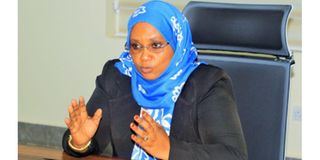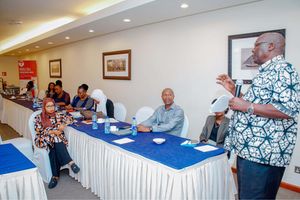Sugar investor given 3-month ultimatum

The Industry, Trade and Investment minister, Ashatu Kijaji, issued an ultimatum to SJ Sugar Distillery and Power Private during her recent visit in Mtwara Region. PHOTO | COURTESY
What you need to know:
- Investor SJ Sugar distillery and Power Private failed in developing land provided for sugar cane farming, instead planting sunflowers which is contrary to their investment contract
Dar es Salaam. An investor, SJ Sugar Distillery and Power Private has been given a three-month deadline to develop land provided for sugarcane farming.
The company with Indian origins has a permit to produce 10,000 tonnes of sugar in a 4,100-acre area located in Mtwara.
However, part of the area was found to have grown sunflower, contrary to stipulation of the investment contract.
The Sugar Board of Tanzania (SBT) chairman, Filbert Mponzi, was recently quoted as saying that Tanzania will be self-sufficient in sugar by 2025 as efforts are underway to plug the 60,000 tonne deficit.
Production of the crop is currently estimated to be 380,000 tonnes a year against the demand of 440,000 tonnes.
The Industry, Trade and Investment minister, Ashatu Kijaji, issued an ultimatum to SJ Sugar Distillery and Power Private during her recent visit in Mtwara Region.
“Initially, I’d given the company six months fulfil the investment contract. However, after a thorough inspection, I’m now issuing a three-month ultimatum,” said the minister.
She said that the nurseries should be planting sugar cane seeds that will be enough for transplantation in all the 4,100 acres, blaming the company for providing false information.
Dr Kijaji said that the company was informed that there were sugar cane nurseries established in the area, enough to cover 1,000 acres.
“However, this report was false because not only were the seedlings insufficient for 1,000 acres, the farm was found to be abandoned with plantlets having dried. Worse enough, the other part of the land had been planted with sunflowers instead of sugarcane contrary to the company’s investment contract,” she said.
“The company was given permission to cultivate sugar cane in the area in order to increase domestic sugar production and close the existing deficit, why plant sunflowers? Such investors are not required in the country. We are going to make tough decisions in three months,” she added.
Speaking on the decision, SBT director general Kenneth Bengesi said that according to investors the 25 acres nursery had seedlings sufficient for transplantation in 1,000 acres.
“Technically, the seedlings from the 25 acres are insufficient for transplantation in 1,000 acres. At least, if carefully managed they could be enough for only 250 acres at a ratio of one acre seedlings to 10 acres,” he said.
“We are going to make follow up after the given three months because according to investment laws, the minister is mandated with powers to act against any incompliance from investors including revocation of rights,” he added.
Speaking during the visit, a land officer from Mtwara District Council, John Nkoko, said that there were citizens who were yet to be compensated for the land they surrendered for the project.
“At least Sh1 billion was paid to beneficiaries in terms of compensation. However, reports on 194 acres that belonged to 188 citizens are missing. Thus, citizens have not been compensated. But, when the investor was informed, he refused to acknowledge this and make the payment,” he said on behalf of the District Executive Director (DED).
A representative of the investor, Paul Maokola, said that sunflowers were planted after the land was discovered to be unfit for sugar cane farming.
He also asserted that all citizens who deserved compensation had received their payments.
“The 1,000 acres have been invaded by citizens, therefore interfering with investor’s development plans,” said Mr Maokola.
But Prof Bengesi said the 1,000 acres have been left aside for out-growers in the areas who should engage and benefit from the project.
“Over 5,000 acres were requested by an investor. But after the floods in Kilambo Village led to the sweeping of planted sugar cane, another area was given to the investor,” he said.
Another piece of land was given to the company through the Tanzania Investment Centre (TIC) and mandated to provide derivative rights to foreign investors.
Furthermore, he said the land was issued on condition that it be used for sugar cane farming.





